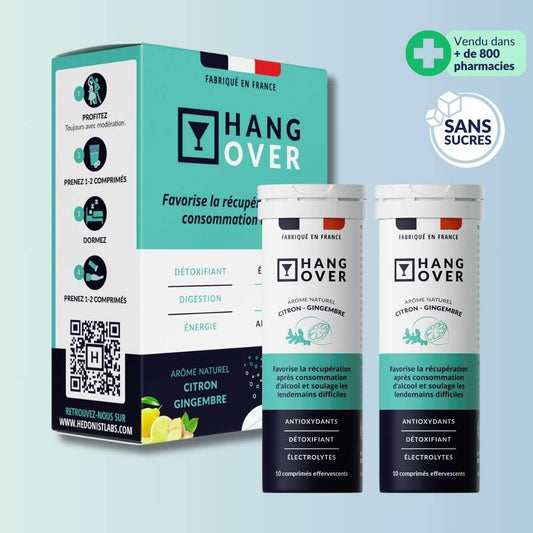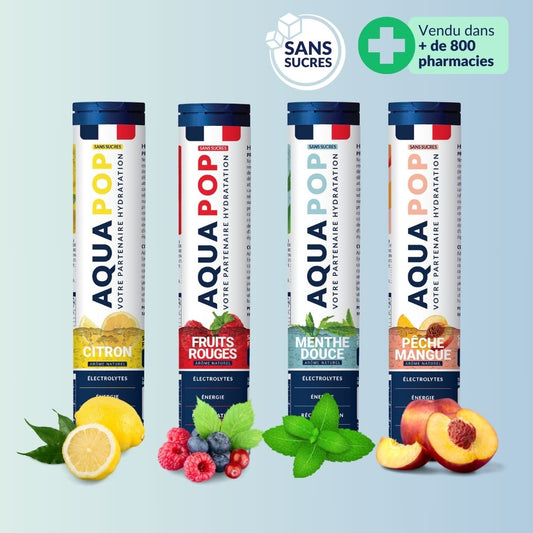HedonistLabs laboratory
Maintaining the body's water balance is a science in itself, requiring much more than water alone. So what's in an optimal hydration solution? Solutions involve a precise blend of salts, minerals and sometimes sugars, essential for restoring homeostasis and supporting vital bodily functions.
What key ingredients should a moisturizing solution contain to be truly effective, and why are they so important to our health?
Hydration is an essential process for maintaining the body's water balance. It involves the intake of fluids to compensate for natural water losses, essential for the proper functioning of our physiological systems. With this in mind, it's crucial to understand the composition of a hydration solution to ensure adequate fluid intake to maintain our health and well-being.
WATER COMPOSITION
Water, the fundamental substance for hydration, is a simple molecule composed of two hydrogen atoms (H) and one oxygen atom (O), giving it the chemical formula H2O. This molecular structure gives it unique physical and chemical properties, making it a vital element for life on Earth.
In terms of physical properties, water is distinguished by its polarity. Due to the difference in electronegativity between oxygen and hydrogen, the water molecule has a negative partial charge near the oxygen atom and positive partial charges near the hydrogen atoms. This polarity enables water to form hydrogen bonds, contributing to its characteristics such as its ability to dissolve many substances, its high surface tension and its specific heat capacity.
Chemically speaking, water is a universal solvent, capable of dissolving a wide variety of compounds, making it an indispensable reaction medium for many biochemical and physiological reactions. What's more, water plays a crucial role in regulating body temperature thanks to its thermal properties, notably its ability to absorb and release large quantities of heat with minimal temperature change.
ESSENTIAL COMPONENTS OF A MOISTURIZING SOLUTION
To be effective, a hydration solution must contain several key components, each playing a specific role in maintaining the body's water balance and physiological functions.
- Pure water: Water is the foundation of any hydration solution. It is essential to compensate for water loss through perspiration, respiration and excretion. Pure water is needed to maintain cellular hydration and ensure the proper functioning of the body's organs and systems.
- Electrolytes Electrolytes are electrically charged minerals present in the body, such as sodium, potassium and chloride. They play a crucial role in regulating water balance, maintaining osmotic pressure and transmitting nerve impulses. When we sweat, we lose not only water but also electrolytes, so it's important to replace them to avoid dehydration and maintain homeostasis.
- Carbohydrates (sugars) for energy: Carbohydrates provide a rapidly available source of energy for the muscles and brain. During intense or prolonged physical activity, carbohydrate intake in a hydration solution can help replenish glycogen reserves and maintain physical and mental performance.
- Other essential nutrients Depending on individual needs and circumstances, a hydration solution may also contain other essential nutrients such as vitamins and minerals. These micronutrients play a role in many biological functions, including metabolic regulation, the immune system and bone health.
By combining these essential components, a hydration solution can help maintain proper hydration levels, restore lost electrolytes and provide the energy and nutrients needed to support physical and mental performance, as well as overall health.
DIFFERENT TYPES OF HYDRATION SOLUTIONS
- Isotonic solutions Isotonic solutions have an electrolyte concentration similar to that of blood plasma, meaning they have the same osmotic pressure as body fluids. They are often used to rapidly rehydrate the body after intense exercise or mild-to-moderate dehydration. Isotonic solutions are well absorbed by the body and help restore electrolyte balance without causing osmotic imbalance.
- Hypotonic solutions Hypotonic solutions have a lower electrolyte concentration than blood plasma. They are mainly used to rehydrate patients suffering from severe dehydration, as they provide extra water while allowing rapid absorption of electrolytes. However, the use of hypotonic solutions can further dilute electrolytes in the body, leading to electrolyte imbalance if they are not administered with care.
- Hypertonic solutions Hypertonic solutions have a higher concentration of electrolytes than blood plasma. They are used in situations where rapid rehydration is required, such as in cases of severe dehydration due to vomiting or excessive diarrhea. Hypertonic solutions are effective in restoring fluid balance by providing high levels of water and electrolytes, but must be administered with caution to avoid excessive increases in blood osmotic pressure.
FACTORS TO CONSIDER WHEN CHOOSING A HYDRATION SOLUTION
- Level of physical activity The level of physical activity has a considerable influence on hydration requirements. People who are very active or who take part in intense physical exercise lose more water and electrolytes through perspiration. As a result, they may benefit from hydration solutions containing electrolytes and carbohydrates to help maintain water balance and provide energy during exercise.
- Environmental conditions (heat, humidity) Environmental conditions such as heat and humidity also affect hydration requirements. In hot weather or very humid environments, the body sweats more to regulate its internal temperature, resulting in increased loss of water and electrolytes. In such conditions, it's important to choose a hydration solution that helps to effectively replace lost fluids and maintain electrolyte balance.
- Individual needs (age, weight, gender) Hydration needs vary from person to person, depending on factors such as age, weight, gender and health conditions. For example, children and the elderly may have different hydration needs due to their metabolism and ability to regulate body temperature. Similarly, pregnant or breastfeeding women may have increased fluid requirements to support foetal growth or breast milk production.
With these factors in mind, it's important to choose a hydration solution tailored to your individual needs and specific circumstances. Isotonic solutions are generally recommended for most routine physical activities, but in certain situations, such as intense exercise or extremely hot environments, solutions containing additional electrolytes may be required to optimize hydration and performance.
EXAMPLES OF POPULAR HYDRATION SOLUTIONS
- Drinking water: Drinking water is the simplest and most natural form of hydration solution. It is widely available and is an ideal option for maintaining hydration on a daily basis. Drinking water is particularly recommended for low-intensity activities and for quenching thirst throughout the day.
- Sports drinks: Sports drinks are specially formulated to provide effective hydration during intense physical exercise. They generally contain water, electrolytes such as sodium and potassium, and carbohydrates to provide energy for the muscles. These drinks help replace fluids and electrolytes lost through perspiration, and maintain performance during exercise.
- Oral Rehydration Solutions (ORS) Oral rehydration solutions, also known as ORS (Oral Rehydration Solutions), are special preparations used to treat dehydration caused by illnesses such as diarrhea or cholera. They contain a precise blend of water, glucose and electrolytes, such as sodium and potassium, to help restore the body's water and electrolyte balance.
- Fruit-based drinks Fruit-based drinks, such as smoothies and fresh fruit juices, can also contribute to hydration, while providing vitamins, minerals and antioxidants that are beneficial to health. However, it's important to choose fruit-based drinks in moderation, as they can contain high amounts of added sugar.
These examples of popular hydration solutions offer a variety of options to meet fluid and electrolyte needs in different situations, whether during exercise, to treat dehydration due to illness, or simply to maintain optimal hydration on a daily basis.
Hydration is an essential element of health and well-being, and choosing the right hydration solution is crucial to maintaining a good water balance in the body. In this discussion, we looked at the main components of a hydration solution, including water, electrolytes, carbohydrates and essential nutrients, as well as the different types of hydration solutions available.
It's important to consider several factors when choosing a hydration solution, such as level of physical activity, environmental conditions and individual needs. Choosing the right hydration solution can help maintain fluid balance, prevent dehydration and support physical and mental performance.
Finally, it's crucial to stress the importance of maintaining good hydration for optimal health. Drinking enough water and choosing hydration solutions tailored to our individual needs not only helps maintain water balance in the body, but also supports metabolic processes, improves physical and mental performance, and promotes overall health.
In short, by maintaining adequate hydration and choosing appropriate hydration solutions, we can take care of our bodies and our well-being, and thus live healthier, more fulfilling lives.




